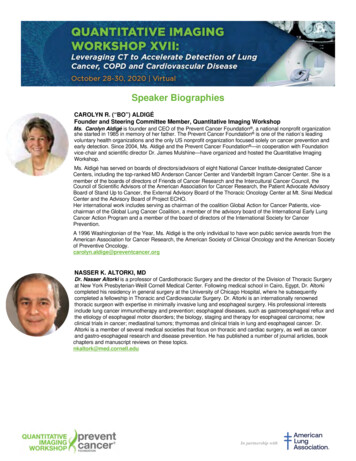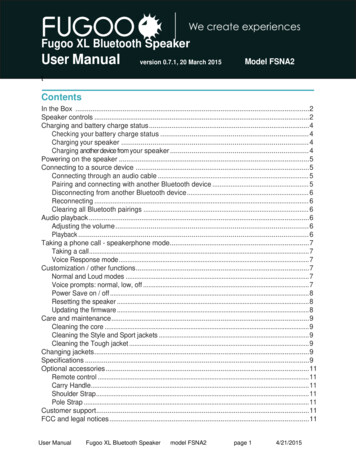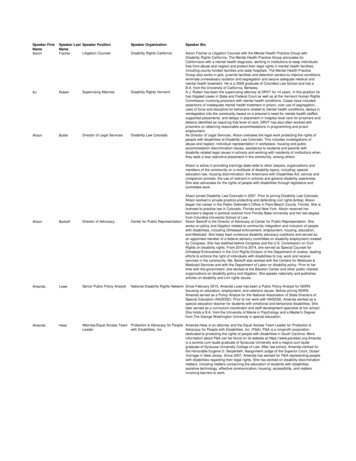
Transcription
Speaker BiographiesCAROLYN R. (“BO”) ALDIGÉFounder and Steering Committee Member, Quantitative Imaging WorkshopMs. Carolyn Aldigé is founder and CEO of the Prevent Cancer Foundation , a national nonprofit organizationshe started in 1985 in memory of her father. The Prevent Cancer Foundation is one of the nation’s leadingvoluntary health organizations and the only US nonprofit organization focused solely on cancer prevention andearly detection. Since 2004, Ms. Aldigé and the Prevent Cancer Foundation —in cooperation with Foundationvice-chair and scientific director Dr. James Mulshine—have organized and hosted the Quantitative ImagingWorkshop.Ms. Aldigé has served on boards of directors/advisors of eight National Cancer Institute-designated CancerCenters, including the top-ranked MD Anderson Cancer Center and Vanderbilt Ingram Cancer Center. She is amember of the boards of directors of Friends of Cancer Research and the Intercultural Cancer Council, theCouncil of Scientific Advisors of the American Association for Cancer Research, the Patient Advocate AdvisoryBoard of Stand Up to Cancer, the External Advisory Board of the Thoracic Oncology Center at Mt. Sinai MedicalCenter and the Advisory Board of Project ECHO.Her international work includes serving as chairman of the coalition Global Action for Cancer Patients, vicechairman of the Global Lung Cancer Coalition, a member of the advisory board of the International Early LungCancer Action Program and a member of the board of directors of the International Society for CancerPrevention.A 1996 Washingtonian of the Year, Ms. Aldigé is the only individual to have won public service awards from theAmerican Association for Cancer Research, the American Society of Clinical Oncology and the American Societyof Preventive Oncology.carolyn.aldige@preventcancer.orgNASSER K. ALTORKI, MDDr. Nasser Altorki is a professor of Cardiothoracic Surgery and the director of the Division of Thoracic Surgeryat New York Presbyterian-Weill Cornell Medical Center. Following medical school in Cairo, Egypt, Dr. Altorkicompleted his residency in general surgery at the University of Chicago Hospital, where he subsequentlycompleted a fellowship in Thoracic and Cardiovascular Surgery. Dr. Altorki is an internationally renownedthoracic surgeon with expertise in minimally invasive lung and esophageal surgery. His professional interestsinclude lung cancer immunotherapy and prevention; esophageal diseases, such as gastroesophageal reflux andthe etiology of esophageal motor disorders; the biology, staging and therapy for esophageal carcinoma; newclinical trials in cancer; mediastinal tumors; thymomas and clinical trials in lung and esophageal cancer. Dr.Altorki is a member of several medical societies that focus on thoracic and cardiac surgery, as well as cancerand gastro-esophageal research and disease prevention. He has published a number of journal articles, bookchapters and manuscript reviews on these topics.nkaltork@med.cornell.eduIn partnership with
CHRISTOPHER AMOS, PhDDr. Christopher Amos is a genetic epidemiologist and the director of the Institute for Clinical and TranslationalResearch at Baylor College of Medicine, where he is also the associate director for quantitative science at theDan L. Duncan Comprehensive Cancer Center. He is known for his research on the genetic basis of certaintypes of human cancer.A recipient of the 2020 American Association for Cancer Research-American Cancer Society Award forResearch Excellence in Cancer Epidemiology and Prevention, Dr. Amos has been instrumental in thedevelopment of novel methods for the analysis of quantitative traits for genetic analysis of complex diseasesfocusing on cancer etiology. He was the first author of a landmark paper in Nature Genetics that identified aregion of robust linkage disequilibrium within 15q25 as a lung cancer susceptibility gene locus. He leads aninternational grant focusing on understanding gene-environment joint effects on lung cancer risk and biomarkersfor early detection. Also, he is leading a Cancer Prevention Research Institute of Texas grant focusing onidentifying predictors of relapse for early stage lung cancer.Dr. Amos joined the Department of Epidemiology at the University of Texas MD Anderson Cancer Center in1992, where he founded the Section of Computational and Genetic Epidemiology. In 2012, he was named theinaugural chair of the Department of Biomedical Data Science at the Geisel School of Medicine at DartmouthCollege. He became director of the Institute for Clinical and Translational Research at Baylor College of Medicinein 2017. Dr. Amos earned his undergraduate degree in mathematics from Reed College and received his masterof science degree and his PhD in biometry at the Louisiana State University Medical Center.chris.amos@bcm.eduSAMUEL ARMATO, PhDDr. Samuel Armato is an associate professor in the Department of Radiology at the University of Chicago andchair of the Committee on Medical Physics, where he is actively researching and developing new methods forcomputer-aided diagnosis, specifically for thoracic imaging.Dr. Armato’s research has focused on various medical areas, including lung cancer screening, specializedimaging tests such as dynamic contrast-enhanced computed tomography scans to determine treatmentresponse in malignant pleural mesothelioma and computerized medical image analysis (including AI techniques).He served as the principal investigator for the National Cancer Institute-sponsored Lung Image DatabaseConsortium project that spanned 10 years and has written or co-authored over 100 research articles that havebeen published in prestigious, peer-reviewed medical journals and books. Dr. Armato received his PhD inmedical physics from the University of Chicago.s-armato@uchicago.eduRICARDO AVILA, MSSteering Committee Member, Quantitative Imaging WorkshopMr. Ricardo Avila is a computer scientist and CEO of Accumetra, LLC, a high-performance imaging servicescompany focused on advancing the science of image-based decision making. Mr. Avila has extensiveexperience leading the development of health care applications in academic, government and commercialsettings, including at Howard Hughes Medical Institute, GE Global Research, Kitware and the United StatesDepartment of Veterans Affairs. His main area of expertise is in the development of computer-aided detectionalgorithms for early lung cancer and the quantitative measurement of lung nodule size change over time.Throughout his career, he has contributed to several open science projects including major open sourceinitiatives (VTK, ITK and OSEHRA) as well as Give-A-Scan, a patient donated and openly available CT scandatabase for accelerating lung cancer research. Mr. Avila received a master’s degree in computer science fromthe State University of New York at Stony Brook, specializing in 3D biomedical imaging and visualization.rick.avila@accumetra.comIn partnership with
MARY BARTON, MD, MPPDr. Mary Barton oversees the development, use and maintenance of techniques National Committee for QualityAssurance (NCQA) uses to evaluate health care quality. She ensures the scientific integrity of NCQAmeasurement and research. She also leads NCQA in winning and executing health care quality measurementcontracts for federal and state governments.Prior to NCQA, Dr. Barton worked for the Agency for Healthcare Research and Quality (AHRQ), where she wasthe scientific director of the US Preventive Services Task Force (USPSTF). She supported and providedoversight for the methodological, evidence review and recommendation-making work of the USPSTF. Beforejoining AHRQ, Dr. Barton was an assistant professor at Harvard Medical School, where she performed clinicalepidemiology and health services research related to cancer screening and prevention in terms of access, testperformance and outcomes.Dr. Barton trained in primary care internal medicine at Brigham and Women’s Hospital in Boston and completeda general medicine research fellowship at Harvard. She has a clinical interest in and has presented widely aboutthe performance of the clinical breast examination, and she is a member of the American College of Physiciansand the Society of General Internal Medicine.barton@ncqa.orgBARTOLOME CELLI, MD, FCCPDr. Bartolome Celli is one of the world’s leading experts in the area of pulmonary medicine, with a particularemphasis on Chronic Obstructive Pulmonary Disease (COPD). He currently serves as professor of medicine atHarvard Medical School and director of the COPD Center at Brigham and Women’s Hospital. Throughout hisdistinguished career, Dr. Celli has been a principal investigator or co-investigator of many groundbreakingresearch studies examining biomarkers in COPD, comparing the effectiveness of various respiratory therapiesand examining the impact of specific drug regimens on COPD outcomes. Throughout the years, his research hasbeen funded by the National Institutes of Health, various foundations and multiple industry partners. Among hisinnovative works are the development of two indices to improve COPD clinical care including the BODE indexwhich helps evaluate mortality risk in COPD patients and the COTE index which measures COPD Co-morbidityseverity.Dr. Celli received his doctor of medicine from the Universidad Central de Venezuela in Caracas, Venezuela. Hecompleted his residency in internal medicine at St. Vincent’s Hospital in Worcester, MA and Boston City Hospital,followed by clinical and research fellowships in pulmonary medicine at Boston City Hospital, the Boston V.A.Medical Center and Boston University Medical Center. He has published over 400 peer-reviewed scientificpapers and 425 abstracts and edited several books. Dr. Celli has been the chairman of the committee thatestablished the American Thoracic Society and European Respiratory Society guidelines for the diagnosis andtreatment of COPD. In addition, he is on the Scientific Committee of the Global Obstructive Lung Disease(GOLD) initiative and currently serves on the board of directors of GOLD. Although caring for patients providesunique pleasure, Dr. Celli’s greatest achievement is to have personally helped mentor many young clinicians inmedicine.bcelli@copdnet.orgMARCUS CHEN, MDDr. Marcus Chen is the director of Cardiothoracic Computed Tomography at the National Heart, Lung, andBlood Institute at the National Institutes of Health (NIH) located in Bethesda, Maryland. Dr. Chen is a graduate ofthe California Institute of Technology in Pasadena, California. He earned his MD degree at the University ofWisconsin at Madison and completed training in internal medicine, nuclear medicine, cardiology and computedtomography at the University of Colorado in Denver. After completing a magnetic resonance imaging fellowship,Dr. Chen has been on staff at the NIH since 2009.Dr. Chen is a blend between a clinician, imager and an engineer. Although clinically trained as a non-invasivecardiologist, Dr. Chen has redirected his expertise in reducing radiation for cardiac imaging towards the unmetneeds of improving CT imaging of the lungs. Dr. Chen’s clinical and research interests include radiationreduction, technical development of new imaging methods and machine learning/artificial intelligence. Dr. Chenhas co-authored nearly 100 peer-reviewed papers and was selected as a finalist for the 2017 American ThoracicSociety BEAR (Building Education to Advance Research) Cage competition and was a recipient of the 2019American Thoracic Society Research Innovation and Translation Achievement Award.chenmy@nhlbi.nih.govIn partnership with
GERARD CRINER, MD, FACP, FACCPDr. Gerard Criner is professor of medicine and chair of the Department of Thoracic Surgery and Medicine atTemple University Health System Lung Center. He earned his medical degree from Temple University School ofMedicine in Philadelphia in 1979. Thereafter he completed his residency training at Temple University Hospital,serving as chief medical resident from 1982-83. Dr. Criner then completed a Pulmonary and Critical CareMedicine fellowship at Boston University School of Medicine. After spending two years at the Baltimore VAMedical Center as acting chief of Pulmonary and Critical Care Medicine, he returned to Temple University in theDepartment of Medicine, Division of Pulmonary and Critical Care Medicine. In 2015 he became the foundingchair of the Department of Thoracic Medicine and Surgery.Dr. Criner has extensive experience in conducting, designing and leading multicenter trials in capo for the past25 years. He was the overall study principal investigator for Simvastatin for the Prevention of COPDExacerbations (STATCOPE) an international clinical trial (US and Canada) with over 44 clinical sites. He wasresponsible for the study concept, design, creation of study time points and interventions, recruitment of clinicalcenters in the U.S. and Canada and led the closure of the study with involvement in data collection, dataanalysis, quality control and reporting of trial results. He has been involved in multiple NIH steering committees,ad hoc technical panels and capo work groups over the past 20 years. He has also developed severalmulticentered trials with industry that includes the use of lung coils (PneumRX), tissue glue (AERIS) andendobronchial valves to reduce hyperinflation in emphysema (LIBERATE, Pulmonx and EMPROVE, Spiration).gerard.criner@tuhs.temple.eduPHILLIP A. DENNIS, MD, PhDDr. Phillip Dennis is vice president of Lung Cancer Strategy and Global Clinical Lead of Lung Cancer ImmunoOncology for AstraZeneca. He was previously director of the Center of Excellence in Thoracic Oncology at JohnsHopkins and the director of the Sidney Kimmel Comprehensive Cancer Center at Johns Hopkins Bayview. Priorto these roles, he was a senior investigator at the US National Cancer Institute, where his research focused onthe role of the PTEN/PI3K/Akt pathway in cancer and the development of therapies for cancers and those wholive with PHTS. Since joining AstraZeneca in late 2014, Dr. Dennis has coordinated lung cancer strategy acrossthe organization. In addition, he took on an additional role of global clinical leadership for several studiesinvestigating durvalumab, an anti PD-L1 antibody, in non-small cell lung cancer (NSCLC) clinical trials. Thesetrials included PACIFIC, which led to global regulatory approvals for durvalumab in stage III NSCLC. Dr. Dennisreceived both his medical doctorate and PhD from the New York University School of Medicine. He is an electedmember of the American Society for Clinical Investigation.phillip.dennis@astrazeneca.comSEAN FAIN, PhDDr. Sean Fain is a professor of Medical Physics, Radiology and Biomedical Engineering and directs thePulmonary and Metabolic Imaging Center in the Departments of Radiology and Medical Physics at the School ofMedicine and Public Health, University of Wisconsin – Madison. His research develops quantitative imagingmethods using magnetic resonance imaging (MRI) and CT. His research is highly translational, includingleadership roles in multi-center imaging studies of asthma (Severe Asthma Research Program; The Great LakesPrecISE Partnership), and industry collaborations (GE Healthcare, Xemed LLC, Polarean, Imbio LLC) to improvequantitative measures of lung disease. He is the physics chair of the of the CT Lung Density BiomarkerCommittee of the Quantitative Image Biomarkers Alliance (QIBA) and is working with the COPD Foundation onquantitative CT imaging biomarkers of airway remodeling and parenchymal density to improve phenotyping ofobstructive lung disease.sfain@wisc.eduRAJA FLORES, MDDr. Raja Flores is a world-renowned thoracic surgeon known for his technical skill and life-long work on lung andesophageal cancer, mesothelioma and asbestos-related diseases. His research has produced over 250publications and he is the principal investigator of a 4.8 million-dollar RO1 grant to study the effect of asbestoscontamination in the town of Libby, Montana. He is currently investigating the health effects of mold exposure onNew York City Housing Authority (NYCHA) tenants. He was educated at New York University, Einstein,Columbia and Harvard. He is professor and founding chairman of the Department of Thoracic Surgery at theMount Sinai School of Medicine in New York City.raja.flores@mountsinai.orgIn partnership with
LEE GAZOURIAN, MDDr. Lee Gazourian is director of Quantitative Analysis and co-director of research at the Lahey Hospital &Medical Center. His primary research interests are to apply quantitative Computer Tomography imagingtechnology to the lung cancer screening and COPD patient populations. He is currently the principle investigatorof a multi-center study utilizing the lung cancer screening cohorts at Lahey Hospital & Medical Center, MountAuburn Hospital, Boston Medical Center and Baystate Medical Center. To date over 16,000 patients have beenscreened with over 40,000 total CT scans performed. His research focuses on objective assessments of thepulmonary and extra pulmonary manifestations of disease both at baseline and longitudinally. His group iscurrently evaluating the association between both quantitative and qualitative metrics, of emphysema, interstitiallung disease, coronary artery calcification, pulmonary vascular disease and body composition with clinicaloutcomes including cancer, hospitalizations and quality metrics including COPD/ILD screening, cardiovascularrisk stratification, immunizations and smoking cessation.Dr. Gazourian received his medical doctorate from Boston University School of Medicine and his pulmonary andcritical care training at the combined Harvard program.lee.gazourian@lahey.orgMARYELLEN L. GIGER, PhDDr. Maryellen Giger is the A.N. Pritzker professor of Radiology, Committee on Medical Physics and the Collegeat the University of Chicago. She is also the vice-chair of Radiology (Basic Science Research) and the formerdirector of the CAMPEP-accredited Graduate Programs in Medical Physics/chair of the Committee on MedicalPhysics at the University. Dr. Giger also co-founded Quantitative Insights, Inc., whose product QuantX is the firstFDA-cleared, machine-learning driven system to aid in cancer diagnosis. In 2019, QuantX was named one ofTIME magazine's inventions of the year and is now being developed by Qlarity Imaging.For over 30 years, Dr. Giger has conducted research on computer-aided diagnosis, including computer vision,machine learning and deep learning, in the areas of breast cancer, lung cancer, prostate cancer, lupus and bonediseases. Over her career, she has served on various National Institutes of Health (NIH) and other fundingagencies’ study sections and is now a member of the National Institute of Biomedical Imaging andBioengineering (NIBIB) Advisory Council. Her research in computational image-based analyses of breast cancerfor risk assessment, diagnosis, prognosis, and response to therapy has yielded various translated components,and she is using these image-based phenotypes, i.e., these “virtual biopsies” in imaging genomics associationstudies for discovery. In addition, Dr. Giger is the principal investigator of the newly established Medical Imagingand Data Resource Center (MIDRC) funded by NIBIB to establish highly-curated open datasets of COVID-19images and expedite machine learning methods for detection/diagnosis and assessing therapies.Dr. Giger received her master's degree in physics from The University of Exeter and her doctoral degree inmedical physics from the University of Chicago. She is a member of the National Academy of Engineering and aFellow of the American Association of Physicists in Medicine (AAPM), American Institute for Medical andBiological Engineering, International Society of Optics and Photonics (SPIE), Society of Breast MRI, Institute ofElectrical and Electronics Engineers and International Academy of Medical and Biological Engineering. She is aformer president of the AAPM and was awarded their William D. Coolidge Gold Medal. Dr. Giger is also a formerpresident of the SPIE and is the inaugural editor-in-chief of the SPIE Journal of Medical Imaging. In 2018, shereceived the iBIO iCON Innovator award. Dr. Giger has more than 200 peer-reviewed publications, has morethan 30 patents and has mentored over 100 graduate students, residents, medical students and undergraduatestudents.m-giger@uchicago.eduIn partnership with
GARTH GRAHAM, MD, MPH, FACP, FACCDr. Garth Graham is a leading authority on social determinants of health and health equity. As the vicepresident of Community Health for CVS Health, Dr. Graham leads the enterprise-wide community and socialdeterminants of health (SDoH) strategy, working closely with CVS Health’s many businesses, to ensuredifferentiated, measurable and scalable approaches to addressing community health in communities across thecountry. Additionally, he leads public health partnerships and cardiovascular initiatives for CVS Health. Dr.Graham joined CVS Health through the Aetna acquisition, where he was president of the Aetna Foundationsince 2014.A cardiologist and professor of medicine, Dr. Graham is passionate about the opportunity to improve localhealth through cross-sector collaboration. Dr. Graham previously served as Deputy Assistant Secretary at theUS Department of Health and Human Services under both the Obama and Bush Administrations, where healso ran the Office of Minority Health. He directed the development of the federal government’s first NationalHealth Disparities Plan released under the Obama administration. Dr. Graham was also the assistant dean forhealth policy at the University of Florida School of Medicine, where he led several research initiatives lookingat how to improve outcomes and readmission rates in cardiac patients in underserved populations.He contributes to several boards including the National Heart, Lung and Blood Institute Advisory Council, theInstitute of Medicine Board on Population Health, Board of the National Quality Forum, the American HeartAssociation/American Stroke Associational National Quality Oversight Committee, the American College ofCardiology/American Heart Association Task Force on Clinical Data Standards, the Harvard Medical SchoolDiversity Fund (chair) and was named by the President to the US Federal Coordinating Council on ComparativeEffectiveness Research many others.Dr. Graham has been featured in media outlets including Fortune, USA Today, The Hill, The Chicago Tribune,Essence, U.S. News & World Report, Quartz and Ebony. Dr. Graham holds a medical degree from YaleSchool of Medicine, an MPH from Yale School of Public Health and a bachelor of science degree in biology fromFlorida International University. He completed clinical training at Massachusetts General Hospital and JohnsHopkins where he trained in cardiology and interventional cardiology. He holds three board certificationsincluding internal medicine, cardiology and interventional cardiology.grahamg@aetna.comHANNAH GREEN, MPHMs. Hannah Green is the national director of health policy for the American Lung Association (ALA). Sheoversees the ALA’s policy work on access to care for lung disease patients, particularly in Medicaid and statemarketplaces, and is the American Lung Association’s expert on lung cancer policy and other lung health andhealthcare system policies. Ms. Green also directs the ALA’s State Lung Cancer Screening CoverageProject, which focuses on improving coverage and utilization of lung cancer screening among patients at highrisk for lung cancer, with an emphasis on patients in state Medicaid programs. Ms. Green received her bachelorof arts degree in Government from Smith College and her master’s in public health degree from the JohnsHopkins University Bloomberg School of Public Health.hannah.green@lung.orgMEILAN HAN, MD, MSDr. MeiLan Han is a professor of medicine in the Division of Pulmonary and Critical Care at the University ofMichigan. Dr. Han received her medical degree from the University of Washington in Seattle, WA. Shecompleted her residency in Internal Medicine and fellowship in Pulmonary and Critical Care Medicine at theUniversity of Michigan. Dr. Han has also completed a master's degree program in Biostatistics and Clinical StudyDesign at the University of Michigan School of Public Health.Dr. Han is co-chair of the University of Michigan COPD Quality Improvement Committee and co-authored theUniversity of Michigan COPD Guidelines. Dr. Han’s research has focused on defining phenotypes in COPD usingimaging. She is a lead investigator for several NIH-sponsored COPD studies. She also serves on the scientificadvisory committees for both the COPD Foundation and American Lung Association and serves as aspokesperson for the American Lung Association. She is currently an associate editor for the American Journalof Respiratory and Critical Care Medicine and serves on the editorial boards for Thorax, Lancet RespiratoryMedicine and Journal of the COPD Foundation. She is also a member of the Global Obstructive Lung Diseasescientific committee which is charged with developing an internationally-recognized consensus statement onCOPD diagnosis and management.mrking@umich.eduIn partnership with
CLAUDIA I. HENSCHKE, PhD, MDDr. Claudia Henschke is a pioneer and leading expert in diagnostic radiology with more than 25 years ofclinical and research experience with low-dose CT screening and she has led the implementation of numerouscities, state, national and international lung screening programs.Since the start, in 1992, of the Early Lung Cancer Action Project (ELCAP) Dr. Henschke has worked onadvancing the CT screening research of early lung disease, with a particular focus on lung cancer. ELCAP soongrew into an international program (I-ELCAP), and now she leads a collaborative and international group ofdistinguished physicians and scientists whose 75 institutions have, to date, screened over 79,000 people in 10countries around the world for I-ELCAP.In addition, the success of the I-ELCAP program led to another multi-national study, The Initiative for Early LungCancer Research on Treatment (IELCART), implemented in 2016 to assess the efficacy of various early lungcancer treatments.Prior to joining the Icahn School of Medicine at Mount Sinai in 2010, Dr. Henschke was a faculty member at theHarvard Medical School and the Weill Cornell Medical College. She has authored over 400 peer-reviewedpublications, two books, many scientific presentations and has trained over 80 physician researchers. Dr.Henschke was awarded her PhD from the University of Georgia, her MD from Howard University and shereceived a BA and MS from Southern Methodist University.claudia.henschke@mountsinai.orgROY S. HERBST, MD, PhDDr. Roy Herbst is Ensign Professor of Medicine, professor of Pharmacology, chief of Medical Oncology, andassociate director for Translational Research at Yale School of Medicine, Yale Cancer Center and SmilowCancer Hospital at Yale-New Haven Health System.He is a pioneer in the field of thoracic oncology, having led development and investigation of therapies targetingEGFR and VEGF signaling pathways now part of the standard of care for lung cancer patients whose cancersharbor relevant genetic mutations. His leadership in targeted therapeutics resulted in a American Society ofClinical Oncology (ASCO) plenary talk this year and publication of results of the third-generation EGFR-inhibitorosimertinib for the treatment of resected EGFR-mutant NSCLC in the New England Journal of Medicine. He hasmade equally critical contributions to the use of immunotherapy in oncology. He and his Yale colleagues wereamong the first to describe the PD-1/PD-L1 pathway and to offer trials of PD-L1 inhibitors atezolizumab andpembrolizumab.His ground-breaking work in the area of trial design and execution (i.e., BATTLE, BATTLE 2) paved the way forthe larger cooperative, multi-drug, biomarker-based clinical trial Lung-MAP, for which he serves as nationalprincipal investigator. Dr. Herbst leads one of five lung cancer-focused National Cancer Institute SPORE grants,which investigates novel immune based therapies, new methods to combat treatment resistance, andunderstanding mechanisms of brain metastasis, among other research.Dr. Herbst is a Fellow of the American Society of Clinical Oncology and a member of the American Associationof Cancer Research (AACR), where he chairs the Tobacco Task Force and serves as an elected member of itsBoard of Directors. In 2020, Dr. Herbst was awarded the AACR Distinguished Public Service Award forExceptional Leadership in Cancer Science Policy. For his lifetime achievement in thoracic cancer research, hewas awarded the 2016 Paul A. Bunn, Jr. Scientific Award by the International Association for the Study of LungCancer (IASLC) and, in 2019, he was elected North America Member of the IASLC Board of Directors.roy.herbst@yale.eduIn partnership with
FRED R. HIRSCH, MD, PhDDr. Fred R. Hirsch is executive director at the Center for Thoracic Oncology in The Tisch Cancer Institute atMount Sinai (TCI) and the Joe Lowe and Louis Price professor of Medicine (Hematology and Medical Oncology)at the Icahn School of Medicine at Mount Sinai. He is also associate director of Biomarker Discovery for TCI.Before joining Mount Sinai, he was a professor of Medicine and Pathology at the University of Colorado for 18years and chief executive officer of the International Association for the Study of Lung Cancer (IASLC) for fiveyears. Dr. Hirsch’s career in lung cancer research spans more than 25 years and includes translational research,targeted therapies and early detection of lung cancer. His research has helped identify and validate prognosticmarkers for lung cancer outcomes and biomarkers for personalized lung cancer therapies that illustrate howthese therapies work and who is most likely to benefit from themDr. Hirsch has re
in 2017. Dr. Amos earned his undergraduate degree in mathematics from Reed College and received his master of science degree and his PhD in biometry at the Louisiana State University Medical Center. chris.amos@bcm.edu SAMUEL ARMATO, PhD Dr. Samuel Armato is an associate professor in the Department of Radiology at the University of Chicago and










